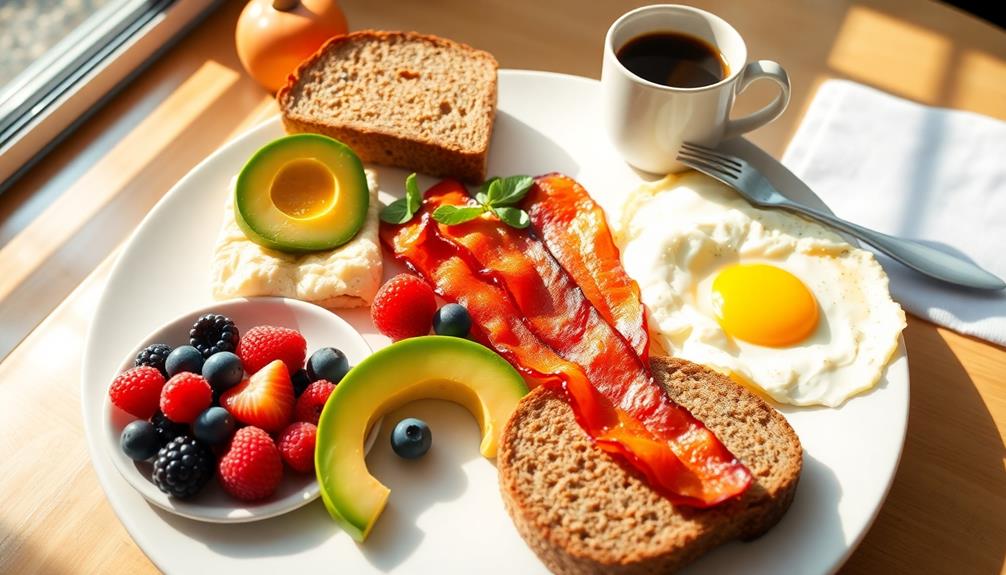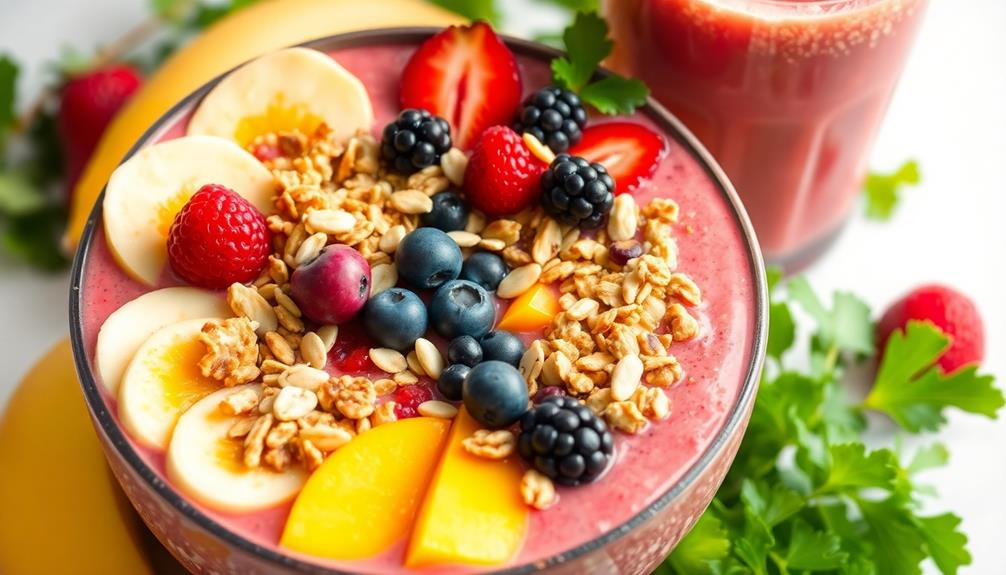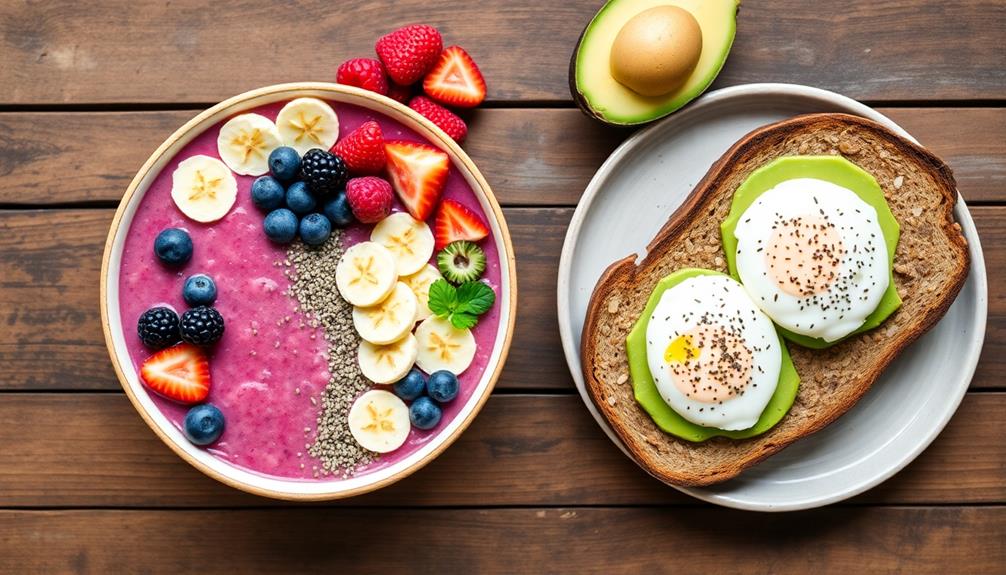A big healthy breakfast fuels your day by providing essential nutrients and energy. Think protein-packed options like Greek yogurt parfaits or egg muffins filled with veggies. Add whole grains, like steel-cut oats paired with almond butter, for complex carbs. Incorporate healthy fats from avocados or nuts to keep you satisfied. Don't forget fiber-rich foods like chia seed pudding or overnight oats to boost fullness. Starting your day with a well-rounded breakfast can stabilize blood sugar and enhance cognitive function, setting you up for success. Keep exploring to discover more delicious and nutritious breakfast ideas!
Key Takeaways
- A big healthy breakfast includes protein sources like eggs and Greek yogurt to support muscle and satiety.
- Incorporate healthy fats from avocados or nuts for sustained energy and fullness throughout the day.
- Opt for complex carbohydrates such as whole grains and fruits to provide lasting energy and essential nutrients.
- Prioritize fiber-rich foods like chia seeds and oats to prolong fullness and improve digestive health.
- Avoid processed foods and sugary drinks which offer empty calories and can spike blood sugar levels.
Healthy Breakfast Ideas
Starting your day with a nutritious breakfast can set a positive tone for the rest of your day. To kick things off, consider healthy breakfast ideas that balance protein, whole grains, and healthy fats. One great option is a Greek yogurt parfait layered with fresh fruits and a sprinkle of granola. This meal packs a protein punch while offering fiber and antioxidants.
For those following a ketogenic diet, you might also enjoy Keto Breakfast With Eggs, which features a variety of delicious egg-based recipes that are high in protein and low in carbohydrates.
Another idea is steel-cut oats topped with sliced bananas and a dollop of almond butter. This combination provides complex carbohydrates and healthy fats, keeping you full and energized.
If you're short on time, meal prep some chia seed pudding the night before, mixing chia seeds with almond milk and letting it sit overnight. In the morning, add your favorite fruits for a delicious, fiber-rich breakfast.
Smoothie bowls are also fantastic breakfast options. Blend leafy greens, a banana, and a scoop of protein powder for a nutritious base, then top it with nuts, seeds, and berries.
These meals not only support your physical health but also boost cognitive function and mood, helping you tackle your day with confidence.
Benefits of a Big Breakfast

Starting your day with a big breakfast can kickstart your metabolism and keep your energy levels steady.
By fueling up with a nutritious meal, you enhance your nutritional intake, ensuring your body gets the essential vitamins and minerals it needs.
This commitment to a hearty breakfast sets a positive tone for the rest of your day.
Boosts Metabolism Efficiently
A big breakfast can greatly boost your metabolism, effectively jumpstarting your body's energy conversion processes after a night of fasting. By consuming a substantial breakfast, you can improve your overall health and support weight loss goals.
Here are four reasons why a big breakfast is beneficial:
- Fuel Your Day: A balanced breakfast, rich in protein sources and whole grain bread, helps you feel full, reducing the chances of overeating later.
- Stabilize Blood Sugar: Eating a hearty breakfast promotes blood sugar control, essential for maintaining energy levels and preventing insulin resistance.
- Nutrient Intake: Those who enjoy a large breakfast often have better diet quality, boosting your intake of crucial nutrients like fiber, iron, and calcium.
- Chronic Disease Prevention: Regularly eating a big breakfast is linked to a lower risk of heart disease, thanks to its positive impact on metabolic function.
Incorporating a healthy, big breakfast into your routine can set you on a path to better health.
Sustains Energy Levels
Eating a hearty breakfast not only boosts your metabolism but also plays a significant role in sustaining your energy levels throughout the day. By replenishing glycogen stores after an overnight fast, you set yourself up for success.
Good breakfast foods include options rich in protein, fiber, and healthy fats, like whole grain toast topped with avocado or nut butter. These nutrients help decrease hunger hormones, keeping your cravings in check and your energy levels steady.
Research shows that those who enjoy a substantial breakfast perform better on tasks requiring cognitive function, enhancing attention and memory. When you fuel yourself properly, you're more likely to stay focused and productive.
Plus, individuals who eat larger breakfasts tend to have better overall diet quality, which means they're consuming more essential nutrients that support sustained energy.
Regularly enjoying a big breakfast is also linked to a lower risk of chronic conditions like obesity and type 2 diabetes, both of which can negatively impact your energy levels.
Enhances Nutritional Intake
Fueling your morning with a big, healthy breakfast can greatly enhance your nutritional intake. By starting your day with a well-rounded meal, you're not just filling your stomach; you're also setting yourself up for better health.
A balanced breakfast typically includes a mix of protein, healthy fats, and complex carbohydrates, ensuring you get essential vitamins and minerals. Here are four key benefits:
- Improved Nutritional Quality: A hearty breakfast often contains oats, whole grains, and protein sources, leading to higher fiber and iron intake.
- Increased Fruit and Vegetable Consumption: Those who eat breakfast usually include more fruits or vegetables, which are crucial for overall health.
- Longer Satiety: Including healthy fats in your breakfast, like nuts or avocado, can keep you full longer.
- Better Cognitive Function: A nutritious breakfast enhances memory and concentration, helping you stay sharp throughout the morning.
Essential Components of Breakfast

Starting your day with a well-rounded breakfast is essential for maintaining energy and focus. To kick things off, include a protein source like eggs or Greek yogurt, which helps support muscle repair and growth. For instance, a single egg provides around 6 grams of protein, making it a great choice.
Next, don't forget healthy fats. Incorporating foods like avocado or nuts can enhance satiety and nutrient absorption, helping your body utilize fat-soluble vitamins effectively.
For sustained energy, turn to complex carbohydrates found in whole grains, fruits, and vegetables. Oatmeal is an excellent option, containing beta-glucan, which aids in lowering cholesterol levels.
To keep you feeling full longer, add fiber-rich foods such as fruits and whole grains; oatmeal alone offers about 10 grams of fiber per cup.
Lastly, prioritize hydration. Starting your day with water or herbal teas can boost your metabolic function and elevate your overall energy levels.
Effects of Skipping Breakfast

Skipping breakfast can leave you feeling hungrier later in the day, which often leads to overeating and poor food choices.
It also increases your risk of nutritional deficiencies, as you miss out on essential vitamins and minerals.
Over time, this habit can contribute to weight gain and make it harder to maintain a healthy lifestyle.
Increased Hunger Later
Breakfast plays an essential role in your daily nutrition, and not eating it can leave you feeling ravenous later. Skipping breakfast often leads to increased hunger later in the day, causing you to overeat at subsequent meals. This heightened appetite can derail your health goals.
Here are some key reasons why a good breakfast matters:
- Metabolism Boost: Regular breakfast consumption helps regulate your metabolism and keeps blood sugar levels steady.
- Balanced Nutrients: Breakfast can give you a head start on your daily nutrient intake, including higher protein intake, which is crucial for satiety. You can get about 20 grams of protein per cup of Greek yogurt!
- Hunger Management: A good breakfast can help boost appetite-regulating hormones, making it easier to manage hunger throughout the day.
- Food Choices: Skipping breakfast often leads you to high-calorie, low-nutrient foods later, which can contribute to weight gain.
Nutritional Deficiencies Risk
Missing out on that first meal can considerably heighten your risk of nutritional deficiencies. When you skip breakfast, you miss out on essential nutrients like fiber, iron, calcium, and vitamins B12 and D, which are vital for your overall health.
Research shows that breakfast skippers often have a lower diet quality, making it difficult to meet dietary recommendations. This lack of a balanced breakfast typically means consuming fewer fruits and vegetables, as well as whole grains, further exacerbating nutrient gaps.
The consequences of skipping breakfast go beyond just feeling hungry later. Inadequate nutrient intake can disrupt your metabolic processes, increasing your risk of chronic diseases and potentially affecting your ability to maintain a healthy weight.
A balanced breakfast not only helps you meet those daily nutritional needs but also sets the tone for healthier eating throughout the day. By prioritizing breakfast, you're taking an important step towards reducing the risk of nutritional deficiencies and supporting long-term health.
Weight Gain Association
A common consequence of not eating breakfast is increased hunger later in the day, which often leads to overeating at subsequent meals. This pattern can considerably affect your weight and overall health.
Research shows that skipping breakfast is linked to a higher risk of obesity and increased BMI levels. Regularly missing this great meal can lead to nutritional deficiencies, as breakfast foods are typically rich in essential nutrients.
Here are four key reasons why you should prioritize breakfast:
- Boost your metabolism: Eating a balanced breakfast jumpstarts your metabolism, helping you manage your weight effectively.
- Control hunger: A protein-packed breakfast keeps you feeling full longer, reducing the chances of overeating later.
- Establish healthy eating habits: Regular breakfast consumption fosters better overall dietary choices throughout the day.
- Prevent weight gain: Avoiding breakfast can lead to unhealthy eating patterns, making weight gain more likely.
Research on Breakfast and Health

Many people underestimate the power of a balanced breakfast and its impact on overall health. Research shows that regular breakfast consumption can greatly improve diet quality, leading to a higher intake of essential nutrients like fiber, iron, folate, and calcium. This is vital for maintaining energy levels and overall wellness.
Here's a quick overview of the potential health benefits of breakfast:
| Health Benefit | Impact on Your Body | Related Nutrients |
|---|---|---|
| Cognitive Function | Reduces risk of cognitive decline | Protein, Iron |
| Blood Sugar Control | Stabilizes glucose levels | Fiber, Calcium |
| Heart Health | Lowers risk of heart disease | Fiber, Folate |
Incorporating nutritious breakfast recipes into your morning routine can enhance your mood and reduce stress levels. By fueling your body with the right foods, you can set a positive tone for the day ahead. So, don't skip that meal! Regular breakfast consumption not only contributes to better health but also helps you maintain ideal cognitive function and a balanced diet.
Quick and Easy Breakfast Options

Starting your day with a nutritious breakfast doesn't have to be time-consuming or complicated. Here are some quick and easy breakfast options that'll keep you energized and satisfied:
- Overnight oats: Soak rolled oats in milk or yogurt overnight. In the morning, add your favorite fruits and nuts for a high-fiber, customizable breakfast.
- Egg muffins: Whip up a batch of egg muffins by mixing eggs with veggies and cheese. These portable, high-protein bites can be made in advance and reheated easily.
- Smoothie bowl: Blend your choice of fruits, veggies, and a source of protein like yogurt or protein powder. In under five minutes, you can enjoy an invigorating and nutritious smoothie bowl.
- Granola bars: Make your own granola bars using rolled oats, nuts, and dried fruits. They're a healthier grab-and-go option compared to store-bought bars.
For a heartier meal, try breakfast burritos filled with whole grain tortillas, eggs, beans, and veggies. They're filling and easy to prepare, perfect for busy mornings.
With these options, fueling your day is a breeze!
Nutritional Benefits of Breakfast Foods

Understanding the nutritional benefits of breakfast foods can greatly enhance your morning routine. Incorporating high-protein options like eggs and Greek yogurt can set a strong foundation for your day. A large egg delivers about 6 grams of quality protein, along with essential nutrients that support brain and eye health. Greek yogurt, with around 15 grams of protein per serving, also boosts your digestive health thanks to its probiotics.
Adding chia seeds to your breakfast can further enhance its nutritional profile. With nearly 10 grams of fiber per ounce, chia seeds promote digestion and help you feel full longer.
Oatmeal, particularly steel-cut or rolled varieties, offers about 10 grams of protein per cooked cup and is known for its cholesterol-lowering beta-glucan content.
Cottage cheese is another fantastic option, providing around 24 grams of protein per cup while remaining low in calories. It not only satisfies your hunger but also supports muscle repair and growth.
Foods to Avoid in Breakfast

While choosing nutritious breakfast foods can set a positive tone for your day, it's equally important to be aware of what to avoid. Certain options can derail your healthy breakfast intentions and impact your overall well-being.
Here are four foods to steer clear of:
- Processed Foods: Pastries and sugary cereals are often high in calories but low in essential nutrients, leading to poor satiety and potential weight gain.
- Sugary Drinks: Commercial fruit juices and sugary coffee drinks are loaded with added sugar that spikes blood sugar levels and contributes to increased calorie intake without substantial nutrients.
- Processed Meats: Bacon and sausage are high in saturated fats and sodium, negatively impacting cholesterol levels and increasing the risk of cardiovascular disease when consumed regularly.
- High-Calorie Snacks: Doughnuts and muffins can pack upwards of 400-600 calories with minimal nutritional value, making them poor choices for a balanced meal.
Meal Planning Tips for Breakfast

To make your mornings smoother and healthier, planning your breakfasts in advance can be a game changer. By focusing on meal planning tips, you can guarantee balanced nutrition and avoid breakfast boredom. Start by selecting a variety of protein sources like eggs, Greek yogurt, and nut butters.
Incorporate whole grains, fruits, and vegetables into your breakfast meal prep for essential fiber and nutrients. Consider batch cooking options, such as overnight oats or egg muffins, which you can make ahead and store for quick grab-and-go meals.
Utilize a meal prep day to portion out ingredients or complete recipes, making it easier to assemble healthy breakfasts during busy mornings.
Here's a simple table for quick reference:
| Protein Sources | Whole Grains | Quick Breakfast Ideas |
|---|---|---|
| Eggs | Oats | Yogurt Parfaits |
| Greek Yogurt | Whole Grain Bread | Smoothies |
| Nut Butters | Quinoa | Savory Bowls |
Keep a list of quick and nutritious breakfast ideas handy to inspire creative combinations. By planning ahead, you'll set yourself up for a week of healthy breakfasts!
Frequently Asked Questions
What Is a Healthy Breakfast to Fuel Your Day?
A healthy breakfast to fuel your day combines protein, healthy fats, and complex carbs. Think scrambled eggs on whole grain toast with avocado or oatmeal topped with nuts and fruits for sustained energy and satisfaction.
What Is Considered a Big Healthy Breakfast?
A big healthy breakfast includes a mix of proteins, fats, and carbs. Think eggs with veggies, oatmeal topped with yogurt, or a smoothie bowl. These meals energize you and keep cravings at bay throughout the day.
What Is the Healthiest Breakfast You Can Eat?
The healthiest breakfast you can eat balances protein, healthy fats, and complex carbs. Consider eggs on whole grain toast with avocado, or Greek yogurt with fruits. These meals energize you and support overall health.
What to Eat for a Big Breakfast?
For a big breakfast, you should include protein like eggs or Greek yogurt, complex carbs such as oatmeal or whole grain toast, healthy fats from avocados or nuts, and fiber-rich fruits or chia seeds.
Conclusion
So, if you think skipping breakfast makes you a superhero, think again! You're just a hungry human, fighting against the forces of energy depletion. Embrace a big, healthy breakfast instead; it's the real power-up you need! After all, who needs focus and energy when you can thrive on an empty stomach, right? Your day deserves more than just a sad granola bar—fuel it with a feast, because being "hangry" isn't a personality trait; it's a cry for help!










